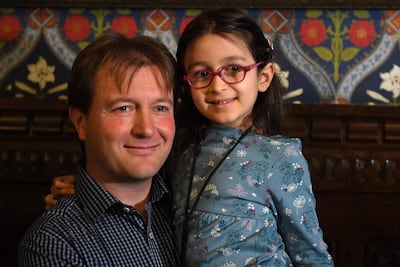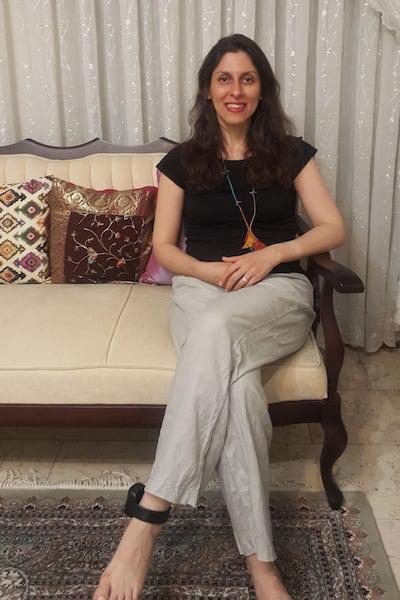British-Iranian aid worker Nazanin Zaghari-Ratcliffe will not be reunited with her family in Britain despite her five-year jail term in Iran ending on Sunday.
Her electronic tag was removed but she was told she must return to court next Sunday, ending slim hopes of her leaving for the UK.
Her member of Parliament in London, Tulip Siddiq, said her worst fear was that Ms Zaghari-Ratcliffe could face another five-year sentence.
British Foreign Secretary Dominic Raab said that the UK government told Tehran she should be released immediately.
“We welcome the removal of Nazanin Zaghari-Ratcliffe’s ankle tag, but Iran continues to put her and her family through a cruel and an intolerable ordeal," Mr Raab said.
“She must be released permanently so she can return to her family in the UK. We will continue to do all we can to achieve this.
“We have relayed to the Iranian authorities in the strongest possible terms that her continued confinement is unacceptable.”
British Prime Minister Boris Johnson said on Twitter: "Pleased to see the removal of Nazanin Zaghari-Ratcliffe’s ankle tag but her continued confinement remains totally unacceptable.
"She must be released permanently so she can return to her family in the UK and we continue to do all we can to achieve this."
Ms Zaghari-Ratcliffe, 43, left Evin jail nearly a year ago as part of a programme to temporarily release thousands of prisoners to deal with the threat of the coronavirus spreading.
She was confined to her parents' home in Tehran and monitored through the electronic tag and regular checks by Iranian officials.
Ms Siddiq, MP for Hampstead and Kilburn where the Ratcliffe family live, said the future remained uncertain.
She said there was no way to predict whether the hearing was to make way for a return or to impose more criminal charges.
"My worst fear is there's another case against her and then we're looking at another five years possibly," Ms Siddiq told radio station LBC.
The aid worker's husband, Richard Ratcliffe, said his wife remained an unwilling participant in a game of high-stakes international diplomacy.
"She is having a nice afternoon, has turned her phone off and is not thinking about the rest of it," Mr Ratcliffe said.
"I'm a bit more guarded. It feels to me like they have made one blockage just as they have removed another, and we very clearly remain in the middle of this government game of chess."
The threat of a new criminal case has been hanging over Ms Zaghari-Ratcliffe since she was summoned back to court last year and warned that she faced further charges.
Her family fears that she could become the subject of new, trumped-up charges to keep her in Iran in a continuing diplomatic dispute between London and Tehran.
Her lawyer, Hojjat Kermani, earlier on Sunday told Iranian website Emtedad that her five-year sentence for plotting to overthrow the clerical establishment was over.
"She was pardoned by Iran's supreme leader but spent the last year of her term under house arrest with electronic shackles tied to her feet. Now they're cast off," Mr Kermani said.
Ms Zaghari-Ratcliffe was stopped at Tehran’s international airport as she was returning to London after visiting her parents with her daughter in April 2016.
Her trial was held in secret and the case against her has never been made public.
Her family campaigned vocally for years to get her out of Evin prison before her March 7 release date.
But in the days before her sentence was due to end, Mr Ratcliffe said he was concerned that Iran would stop her from leaving. Her passport has not been returned.
The tactic was used to prevent US-Iranian former prisoner Baquer Namazi from leaving Iran since his 10-year sentence was commuted nearly a year ago.
The former UN official is in poor health and his son Siamak remains in Iranian jail serving 10 years for espionage.
Ms Zaghari-Ratcliffe's family believe her fate is tied to a decades-old debt over an armaments deal that was cancelled after the 1979 revolution.
The UK failed to deliver tanks but kept the money and the issue is still grinding its way through the courts in London.

Ms Zaghari-Ratcliffe was first made aware of a second case against her in 2017, in which she is accused of “spreading propaganda against the regime”.
Redress, a legal group that represents the family, said the "ongoing cruelty" of the regime breached the UN Convention against Torture.
"Despite having finished her sentence, Nazanin is now being threatened with further charges and more years separated from her husband and daughter," director Rupert Skilbeck said.







